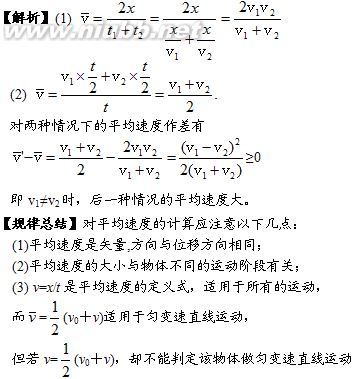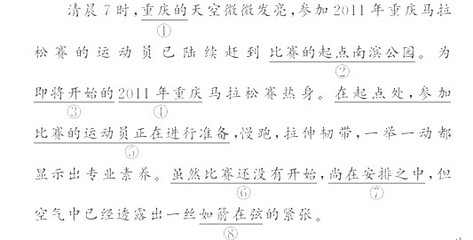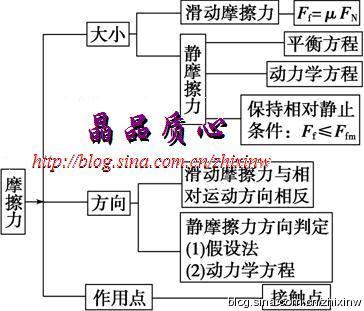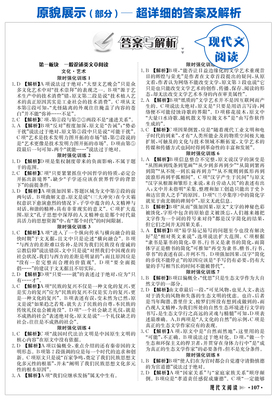一、概说
反意疑问句通常由“陈述句+简略疑问句”两部分组成,第一部分提出一种看法,第二部分用来质疑问或表示证实。陈述部分与疑问部分的动词时态和动词性质应保持一致,而且肯定和否定形式通常彼此相反,即陈述为部分肯定式时,疑问部分用否定式,陈述部分为否定式时,疑问部分用肯定式。
二、反意疑问句的否定问题
1. 基本原则
在通常情况下,陈述部分与疑问部分的肯定彼此相反,即陈述为部分肯定式时,疑问部分用否定式,陈述部分为否定式时,疑问部分用肯定式:
He has read the novel, hasn’t he? 他读过这本小说,是吗?
Jim didn’t come to the meeting, did he? 吉姆没有来开会,是吗?
2. 当陈述部分含半否定句时
若陈述部分含有seldom, hardly, never, rarely, few, nothing, nowhere等否定词或半否定词,其反意问句部分要用肯定式:
Dick rarely got drunk, did he? 迪克很少喝醉,是吗?
Few people like such a man, do they? 很少有人会喜欢那样的人,是吗?
He seldom comes to see you, does he? 他很少来看你,是吗?
Nothing in the book is interesting, is it? 这本书里没有一点是有趣的,是吗?
3. 当陈述部分含否定前缀时
若陈述部分含有带否定前缀的词,反意问句仍用否定式:
It is unfair, isn’t it? 这不公平,不是吗?
It is impossible, isn’t it? 那是不可能的,是吗?
4. 同向反意疑问句
即陈述部分和疑问部分同时为肯定或同时为否定。这类反意疑问句往往具有一定的感情色彩,表示强调、惊讶、怀疑等:
"I’m afraid you failed the exam." "I failed, did I? What a shame!" “你恐怕没考及格。”“没及格?真丢人。”
注:这类反意疑问句的陈述部分句首有时so或oh。如:
So you did not go, didn’t you? 所以你就没去,是不是?
"He’s an artist." "Oh, he’s an artist, is he?" “他是位艺术家。”“啊,他是艺术家吗?”
三、反意疑问句的主语问题
1. 基本原则
反意问句部分的主语应与陈述部分主语一致,只能是代词:
误:Paris is a beautiful city, isn’t Paris?
正:Paris is a beautiful city, isn’t it? 巴黎是个美丽的城市,是吗?
2. 当陈述部分为为there be句型时
反意问句仍用there作“主语”:
There is little to be done now, is there? 现在没有什么办法可想了,是吗?
3. 当陈述部分的主语是指示代词时
反意问句用it, they等代词:
That is a new car, isn’t it? 这是一辆新汽车,是吗?
4. 当陈述部分的主语是不定代词one时
其反意问句可用one(正式)或you(非正式):
One can’t be too careful, can one [you]? 越仔细越好,不是吗?
5. 当陈述部分的主语是复合不定代词时
若陈述部分的主语为somebody, someone, everyone, everybody, no one, nobody等复合不定代词,其反意问句的主语在正式文体中用he,在口语或非正式文体中通常用they:
Nobody was hurt, weren’t they? 没有一个人受伤,是吗?
当陈述部分的主语是 something, anything, nothing, everything等复合不定代词时,其反意问句的主语要用it:
Nothing is important is it? 没有什么重要的,不是吗?
Everything was going well, wasn’t it? 一切都很顺利,是吗?
四、陈述部分有动词have的反意疑问句
1. 当 have 为助动词时
其反意问句沿用同样的助动词:
He has read it, hasn’t he? 他读过了它,是吗?
2. 当 have 为实义动词词时
要分两种情况(:
(1) 若表示“所有”,反意问句可以用have,也可以用do:
He has a lot of friends here, hasn’t he? 他在这儿有许多朋友,是吗?
但是若陈述部分用的是have的否定式,则反意问句用have 还是用do,取决于陈述部分的动词形式:
He hasn’t any money, has he? 他没有钱,是吗?
He doesn’t have any money, does he? 他没有钱,是吗?
(2) 若表示“吃”、“玩”等意思,反意问句要用do:
He has supper at 5, doesn’t he? 他5点吃晚餐,是吗?
He had a good time at the party, didn’t he? 他在晚会上玩得很开心,是吗?
3. 当用于have to时
通常也有两种可能:若表示经常性的行为,则多用加助动词do的形式;若表示特定的行为,则多用have:
He often has to get up early, doesn’t he? 他经常要早起,是吗?
He has to go to bed late tonight, hasn’t he? 他今晚要迟睡,是吗?
五、含情态动词的反意疑问句
1. 基本原则
在通常情况下,当陈述部分含有情态动词时,反意问句会重复前面同样的情态动词:
The boy can read and write, can’t he? 这男孩子会读写,是吗?
We shouldn’t help him, should we? 我们不应该帮助他,对吗?
You couldn’t lend me any money, could you? 你不会借钱给我,对吗?
2. 当陈述部分含有must时
要分两种情况:
(1) 若must表示“必须”或“有必要”,反意问句用 mustn’t 或needn’t:
You must leave at once, mustn’t [needn’t] you? 他必须(有必要)马上离开,是吗?
但是若陈述部分有mustn’t表示禁止,反意问句要must:
You mustn’t laugh, must you? 你不准笑,知道吗?
(2) 若must表示推测,反意问句不能用must,而应根据must后的动词结构采用相应的动词形式:
He must be tired, isn’t he? 他一定累了,是吗?
He must have read it, hasn’t [didn’t] he? 他一定读过它,是吗?
He must have left yesterday, didn’t he? 他昨晚一定走了,是吗?
注:当陈述部分为“must+完成式”时,反意问句可用have (has),也可用did。但若句中出现了过去时间状语,,则通常用did。(如上例所示)
3. 当陈述部分含有 may 时
反意问句根据情况可用mayn’t, mightn’t, won’t等:
I may leave now, mayn’t I? 我可以走了,行吗?
He may be here next week, mightn’t [won’t] he? 他下星期可能来这里,是吗?
4. 当陈述部分含有needn’t时
反意问句通常用need,有时也用must(:
We needn’t tell him, need [must] we? 我们不必告诉他,对吗?
5. 当陈述部分含有ought to时
反意问句在英国英语中用ought to,在美国英语中用should:
We ought to leave early, oughtn’t [shouldn’t] we? 我们应该早点动身,对不对?
六、陈述部分为祈使句的反意问句
1. 基本原则
若陈述部分为祈使句,反意问句通常用will you, won’t you, would you等:
Mail the letter today, will you? 今天就把信发掉,好吗?
Try to be back by two, won’t you? 设法两点之前回来,好吗?
If you want help, let me know, would you? 如果你需要帮助,告诉我,好吗?
注:若陈述部分为否定式,则反意问句部分只用will you:
Don’t forget to post the letter, will you? 请别忘了寄信。
有时根据语境的需要,反意问句也可以用can you, can’t you 等:
Give me some cigarettes, can you? 给我些香烟,可以吗?
Walk faster, can’t you? 走快点,不行吗?
一般说来,用will you, won’t you, would you 等构成的反意问句语气较委婉。比较:
Be quiet, will you? 请安静,好吗?
Be quiet, can’t you? 你不能安静点吗?
2. 当祈使句为Let’s…时
反意问句总是用 shall we:
Let’s phone her now, shall we? 我们现在就给她打电话,好吗?
Let’s go to the cinema tonight, shall we? 今晚咱们去看电影,好吗?
3. 当祈使句为Let us…时
若表示请求,反意问句用will you,若表示表示建议用 shall we:
Let us know your address, will you? 请把你的地址告诉我们,好吗?
Let us go swimming together, shall we? 我们一起去游泳好吗?
注:let’s…只表示建议,所以其后反意问句总是用shall we。而let us…既可表示建议请求,也可表示建议(较正式),其后的反意问句要根据这两种不同情况分别使用will you和shall we。
七、陈述部分为主从复合句的反意疑问句
1. 当陈述部分为主从复合句时
反意问句一般应视主句情况而确定:
She said that I did it, didn’t she? 她说是我干的,是吗?
They know how much it cost, don’t they? 他们知道这花了多少钱,是吗?
2. 当陈述部分为I think (believe, suppose) that...等时
反意问句通常视从句的情况而定(注意否定的转移):
I think that he is wrong, isn’t he? 我认为他错了,是吗(他错了吗)?
I don’t think he likes it, does he? 我认为他不喜欢它,是吗(他喜欢吗)?
I don’t suppose he will come, will he? 我想他不会来了,是吗?
注:这类用法主要限于主语为第一人称且think等动词为一般现在时的情形。
八、几种特殊情况的反意问句
1. 当陈述部分是I’m…时
反意疑问句通常用aren’t I:
I’m wrong, aren’t I? 我错了,是吗?
I’m older than you, aren’t I? 我年纪比你大,对不对?
2. 当陈述部分是I wish…时
反意疑问句通常用may I:
I wish to go with them, may I? 我想同他们一起去,可以吗?
3. 当陈述部分为省略句时
反意疑问句的主语通常应视省略的情况而定:
A nice girl, isn’t she? 她是个好姑娘对吧?
What a nice day, isn’t it? 天气真好,是吧?
4. 当陈述部分有used to时
反意问句可用used to或did:
He used to come here, usedn’t [didn’t] he? 他过去常来这儿,是吗?
5. 当陈述部分有had better时
反意问句用had:
He’d better leave here, hadn’t he? 他最好离开这儿,是吗?
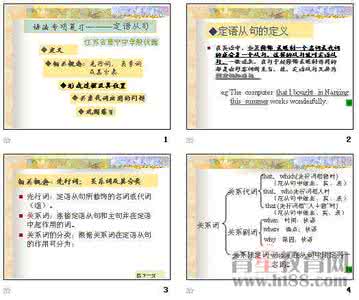
九、反意问句的回答及翻译
1. 肯定反意问句的回答
当陈述部分为否定式,反意问句为肯定式时,其回答往往与汉语不一致,需特别引起注意:
"It isn’t cheap, isn’t it?" "Yes, it is." “它不便宜吧?”“不,很便宜。”
"He doesn’t love her, does he?" "No, he doesn’t."“他不爱她,是吗?”“是的,他不爱她。”
2. 否定反意问句的回答
当陈述部分为肯定式,反意问句为否定式时,其回答一般不会造成困难,一般只需照情况回答即可:
"It’s new, isn’t it?" "Yes, it is." “是新的,对吗?”“对,是新的。”
"He wants to go, doesn’t he?" "No, he doesn’t." “他想去,对吗?”“不,他不想去。”
3. 回答反意问句的原则
回答反意问句通常应根据实际情况来确定,如有人问你You are asleep, aren’t you? 你应回答No, I’m not. 因为既然你能回答,肯定你还没有asleep。但如果别人问你 You aren’t asleep, are you?(你还没有睡着,对吗),你也只能回答No, I’m not.(是的,还没有睡着),而不能回答为Yes, I’m not. 也不能回答成 Yes, I am.
十、反意问句和非反意问句
有些结构看似反意问句,但其实不是,请看以下两例:
I think he will win, don’t you? 我认为他会赢,你说呢?
I think its price will go up, don’t you? 我认为它的价格会上升,你认为呢?
以上两句中的don’t you 为don’t you think so 之省略。
请再看两例:
Many people have read the book, have you? 许多人都读过这本书,你读过吗?
Some students are interested in football, are you? 有些学生对足球感兴趣,你呢?
第一句中的have you 为have you read it 之省略,第二句中的are you为are you interested in football之省略。
十一、重点考点原创精练
1. Few people would agree with this, ______?
A. did they B. would they C. didn’t they D. wouldn’t they
2. Nobody need be afraid of catching the disease, ______?
A. do they B. need they C. don’t they D. needn’t they
3. The police must have known all about this, ______?
A. must it B. must they C. have they D. has it
4. I think it’s high time that she made up her mind, ______?
A. don’t I B. isn’t it C. didn’t she D. hasn’t it
5. If you want help, let me know, ______?
A. can I B. do you C. will I D. will you
6. It’s cheap. I don’t suppose he cares, ______?
A. is it B. do I C. does he D. does it
7. “He’s selfish. I don’t like him, ____?” “No, I don’t at all.”
A. do I B. do you C. don’t I D. does she
8. “I think the teacher is wrong, _____?” “No, I don’t think so.”
A. don’t you B. don’t I C. doesn’t he D. doesn’t she
9. I dare not go out after dark. Let us go together, ______?
A. will you B. shall we C. can you D. can we
10. There are times when such things are necessary, ______?
A. are there B. aren’t there C. are they D. aren’t they
参考答案:1—5 BBCBD 6—10 CBABB
 爱华网
爱华网